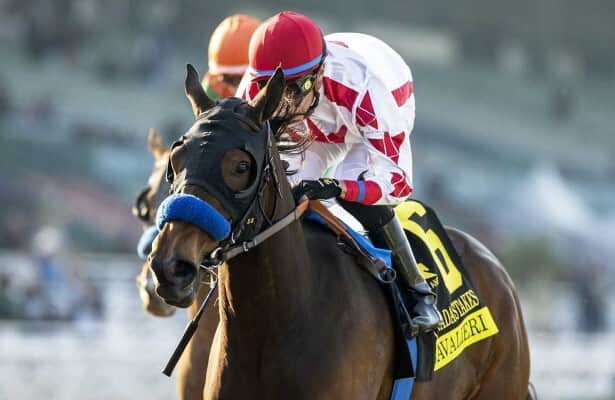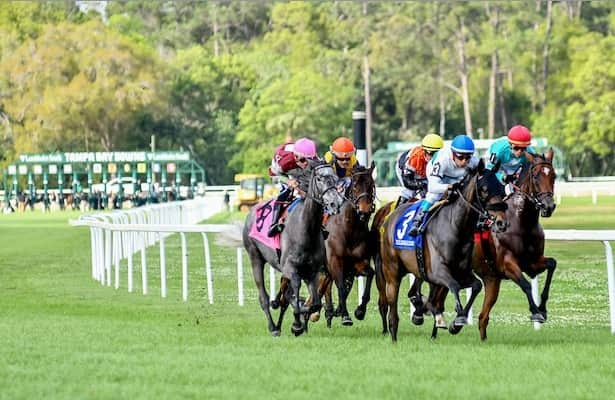Galloping Ahead: Ali Al Ali, CEO and Board Member, Dubai Racing Club | Entrepreneur

You’re reading Entrepreneur Middle East, an international franchise of Entrepreneur Media.
The rapid evolution of professional horse racing in the UAE has mirrored the growth of the country itself. In only three decades since conducting the first professional horse races in 1992, and especially since launching the Dubai World Cup in 1996, Dubai has emerged as a major hub for world-class racing. “The growth of the sport in the region has been remarkable,” says Ali Al Ali who was appointed as the Chief Executive Officer and Board Member of the Dubai Racing Club by H.H. Sheikh Mohammed bin Rashid Al Maktoum, Vice President and Prime Minister of the UAE and Ruler of Dubai, in April 2024.
“In the 1992-1993 season, there were just 97 registered owners of racehorses in the UAE. In 2023, that figure reached to 445. In 1992, there were 41 trainers, which rose to 165 for the 2023 season. Today, we welcome horses from all over the world that run during the Dubai Racing Carnival, including countries such as Japan, Australia, Korea, England, Ireland, France, USA, Hong Kong, and during the season there are up to 500 horses trained here daily.”
The inaugural Dubai World Cup was conducted in 1996 at Nad Al Sheba, one of the five racecourse in the country that also include Abu Dhabi (Abu Dhabi Equestrian Club), Jebel Ali (Jebel Ali Racecourse), Sharjah (Sharjah Equestrian and Racing Club) and Ghantoot (Ghantoot Racing & Polo Club).
Under the helm of the Dubai Racing Club, the Dubai World Cup has become one of the world’s richest horse races with a a total prize pool of USD$30.5 million for the nine-race card, the highlight of which is the $12 million Dubai World Cup itself, a Group 1 race run over the 2,000-meter distance on dirt. In 2010, the event moved to the Meydan Racecourse, the world’s largest grandstand that can host 60,000 spectators which, as Ali explains, “showcases the region’s dedication to the sport, drawing top horses, trainers, and jockeys from around the globe.”
He adds that the Dubai Racing Carnival, an annual series of 16 race meetings that run from November to April, also significantly contributes to the UAE’s international standing in the sector. “With its enhanced format and prize money, the Dubai Racing Carnival provides a prime stage for global talent, while the UAE continues to build on its legacy of high-quality racing,” Ali says. “Neighboring countries have followed suit, hosting valuable meetings, but the UAE remains a key player with its diverse racing calendar. This includes not only Thoroughbred [a horse breed developed for horse racing] racing but also major Purebred Arabian races, such as the newly structured President’s Cup Series, further highlighting the UAE’s commitment to promoting all aspects of the sport.”
Prime Minister of UAE and the Ruler of Dubai His Highness Sheikh Mohammed Bin Rashid Al Maktoum watching horse racing. Dubai, United Arab Emirates. Source: Shutterstock
Furthermore, Ali adds that Dubai has become known for entertainment as a vital part of the racing experience. “Racing events are not only about the competition but about creating an exciting and engaging atmosphere for spectators, with a blend of sport, luxury, and entertainment that draws crowds from all over the world,” he says.
In prioritizing entertainment, but also in fostering international collaboration and embracing innovation, the UAE remains integral to horse racing’s global development. “We are blessed in the UAE with our geographical location, which means we are easily accessible for horses from all four corners of the globe. As such, Dubai is a global hub for traveling horses. In 2023, horse movements increased 9.3%, year on year, to 5,564 imports and exports and we are already well past that number for 2024. Our other strength is the wonderful climate. H.H. Sheikh Mohammed bin Rashid al Maktoum, Vice President and Prime Minister of the UAE and Ruler of Dubai, showed, with the creation of his Godolphin stable [the global thoroughbred breeding operation and horse racing team founded by His Highness Sheikh Mohammed bin Rashid Al Maktoum] in the early 1990s, that Thoroughbreds can winter in the warmth of Dubai and then return to Europe and America and run successfully there. Since then, thousands of horses have benefitted from the winter sun and perfect training conditions.”
The city’s third strength is in its hospitality, Ali adds. “Visitors to the Dubai World Cup receive an experience like no other – from when they step onboard an Emirates Airline plane to when they first experience the awe-inspiring grandstand and facilities at Meydan Racecourse,” he says. “For those who want to enjoy horse racing on a weekly basis throughout the winter, we have the Dubai Racing Carnival, a season packed with incredible sporting action, exceptional dining and entertainment experiences. It’s the perfect evening to spend with friends, family or colleagues.”
Globally, Ali says, horse racing will continue to thrive with historic centers like Newmarket Racecourse in Suffolk, UK, The Curragh Racecourse in Ireland, and the Kentucky Derbi at Churchill Downs in Louisville, Kentucky, USA, but adds that regions like Japan and Hong Kong are emerging as influential players as well. “The axis of power within racing has now switched towards the Far East- Japan and Hong Kong in particular,” he explains. “Dubai has long-established quarantine protocols with both jurisdictions, and we are able to welcome horses from there all year round.”
Ali adds that, while horse racing is a well established sport globally, it faces one specific challenge locally: attracting attention among the many different entertainment and hospitality options on offer within the UAE. “In the UK, horse racing is the second most attended sport after football, and in Hong Kong, the Hong Kong Jockey Club is the single biggest taxpayer to the government, but in the UAE we do face challenges in that it’s a very competitive landscape with many different entertainment and hospitality options on offer. Our mission is to make Meydan Racecourse the number one sporting and entertainment destination in the region, offering an experience like no other. We will achieve this by boosting our marketing strategy, elevating our lifestyle offering, and by targeting new fans of the sport.”

Aerial view of the Meydan Racecourse complex in Nad Al Sheba area. Futuristic design of racecourse entrance in Dubai, UAE. Source: Shutterstock
Going forward, Ali aims to strengthen the brand positioning of the Dubai Racing Club, both locally and globally. “On a larger, more strategic level, we are currently working on developing stronger ties to other horse racing events around the world,” he says. “And, closer to home, it’s important that we always enhance and improve our offering and engage with the local community. We received lots of feedback on social media about the desire for greater access to the animals, and so in November 2024 we will be launching Breakfast Stable Tours, at which people can go behind the scenes and meet the equine stars and see the wonderful environment in which they live. On race nights, we are also opening our Saddling Area to the public also, so that racegoers can see the pre-race action.”
Ali also explores how technological advancements can best support his ambitious goals for the Dubai Racing Club. “We are always exploring opportunities to improve technology, such as tokenisation of horse ownership, which we are actively developing,” he says. “We are also currently redeveloping our website, to make it more user-friendly, and have plans to launch a Dubai Racing Club app also, with an impressive gaming feature that will be sure to attract legions of new fans to the sport. We are lucky as, here in Dubai, we are at the forefront of so many technological advancements and racing is well-placed to tap into these.”
In the end, being at the helm of the Dubai Racing Club requires Ali to strike a delicate balance between tradition and modernity, a task he seems skilled to accomplish successfully. “Horse racing has a proud history and no more so than here in the Middle East, from where the Thoroughbred originates. However, we must move with the times and accept that the beauty of the equine may no longer be enough to sell the sport; fans wish to know how and why it all works and to gain and insight into the lives of those involved. Here, technology and accessibility steps in, and we intend to provide both,” Ali concludes.
Related
Leading Parx jockey Sanchez will serve 7-day suspension
Photo: Jason Moran / Eclipse Sportswire Jockey Mychel Sanchez will serve a seven-day suspension and pay an additional $1,750 in fines
Bill Mott talks about plans for Sovereignty, Just F Y…
Photo: Gulfstream Park / Lauren King Sovereignty, dramatic late-running winner of the Fountain of Youth (G2) March 1, is being pointed
Up-and-coming Cavalieri chases Grade 1 glory in Beholder Mile
Photo: Santa Anita / Benoit Photo Cavalieri and Alpha Bella, who finished one-two in the Grade 3 La Cañada in January at Santa Anita,
4 stakes showcase shipping stars on Tampa Bay undercard
Photo: Gonzalo Anteliz Jr. / Eclipse Sportswire The stars will shine Saturday at Tampa Bay Downs, and not just in the Grade 3 Tampa Ba











